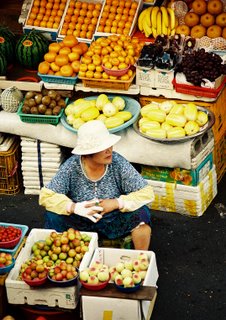 Single white glove and hat - she obviously still thinks "Thriller" was the best album of all time."Ow!!"
Single white glove and hat - she obviously still thinks "Thriller" was the best album of all time."Ow!!" 아줌마 or "AH-joom-mah" usually translates into "auntie" in English and is usually used to describe or address any woman who is married and / or over the age of about 30. Younger Korean women dread the day they will be called 아줌마 , perhaps partly because of the stigma that comes with it. These ladies hold a lot of power in their families (ALL the power). Many have had to endure many hard times in their lives and are determined that their children will have better lives - and God help anyone who gets in the way. Any semblance of feminine submissiveness in youth gives way to blunt, brute force and plain-talking, line-jumping aggressiveness that can be intimidating. As a teacher who deals with Korean parents all the time, I never quite get used to it. However, if you don't get on their bad side, these aunties can be among the most dedicated, caring, selfless, and funny ladies you will ever meet. As an example, one ah-joom-mah in a restaurant I frequented used to yell at me for not finishing my rice (bloody near a capital offense in Korea). The next time I visited, if I was a good boy and cleaned my plate, she would teach me words of Jeju dialect and then laugh her 엉덩이 off with her friends as she had me repeat to all of them what I had learned . I'm always happy to be of entertainment to others, even at my own expense - "Sit, Ubu, sit. Good dog! Now roll over!"

1 comment:
Very similar.
Post a Comment